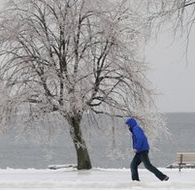
People
in Canada have reported large booming sounds that didn't lead to any
explosives. What they are hearing are "frostquakes," which is kind of
like an earthquake, but produced by the cold weather.
Known
to experts as cryoseisms, frostquakes happen when moisture that has
seeped into the ground freezes very quickly. It expands and builds up
pressure, causing the frozen soil or rock near the surface to crack,
emitting a sound that people have likened to a sonic boom.
They're
not very common because they require such a rapid change in
temperature. In southern Ontario, a drop from 5C (41F) to about -20C
(-4F) was preceded by an ice storm, which ensured there was a lot of
moisture in the ground that became ice.
That doesn't happen every
year, says Geoff Coulson of Environment Canada, who says the term
"frostquake" is new to him. It's like a very weak earthquake and the
house might shake but there is hardly ever significant damage, he says,
and it will only be felt or heard within a kilometre (0.6 miles) at
most.
Where I live, we had rain and then snow with
rapidly-falling temperatures (below zero now), but if I heard a big
boom, I would just assume it's the nearby railroad.
Read more about frostquakes at BBC News.
 People
in Canada have reported large booming sounds that didn't lead to any
explosives. What they are hearing are "frostquakes," which is kind of
like an earthquake, but produced by the cold weather.
People
in Canada have reported large booming sounds that didn't lead to any
explosives. What they are hearing are "frostquakes," which is kind of
like an earthquake, but produced by the cold weather.
No comments:
Post a Comment